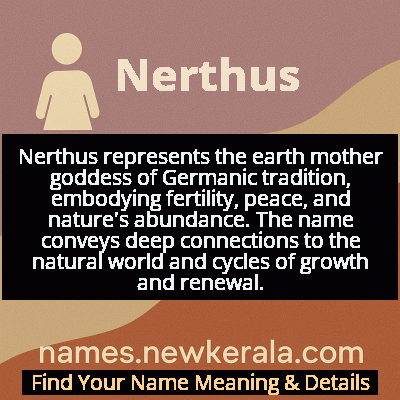Nerthus Name Meaning & Details
Origin, Popularity, Numerology Analysis & Name Meaning of Nerthus
Discover the origin, meaning, and cultural significance of the name NERTHUS. Delve into its historical roots and explore the lasting impact it has had on communities and traditions.
Name
Nerthus
Gender
Female
Origin
Anglo
Lucky Number
6
Meaning of the Name - Nerthus
Nerthus represents the earth mother goddess of Germanic tradition, embodying fertility, peace, and nature's abundance. The name conveys deep connections to the natural world and cycles of growth and renewal.
Nerthus - Complete Numerology Analysis
Your Numerology Number
Based on Pythagorean Numerology System
Ruling Planet
Venus
Positive Nature
Harmonious, responsible, caring, and artistic.
Negative Traits
Overly idealistic, superficial, possessive, or jealous.
Lucky Colours
Pink, turquoise.
Lucky Days
Friday.
Lucky Stones
Diamond, turquoise.
Harmony Numbers
2, 3, 9.
Best Suited Professions
Artists, musicians, teachers, healthcare workers.
What People Like About You
Warmth, nurturing nature, artistic flair.
Famous People Named Nerthus
Nerthus (Mythological)
Germanic Goddess
Primary earth mother deity worshipped across Germanic tribes
Nerthus (Literary)
Mythological Figure
Documented by Roman historian Tacitus in 'Germania'
Nerthus (Modern Revival)
Neopagan Deity
Revived in modern Heathenry as earth mother figure
Name Variations & International Equivalents
Click on blue names to explore their detailed meanings. Gray names with will be available soon.
Cultural & Historical Significance
The name Nerthus is linguistically connected to the later Norse god Njörðr, suggesting a shared origin in Proto-Germanic religion where the deity may have been gender-ambiguous or evolved differently across regions. Her cult emphasized peace, prosperity, and agricultural abundance, with her presence believed to bless the land and ensure successful harvests. The geographical association with an island sanctuary (possibly in the Baltic Sea region) underscores her role as a liminal figure connecting land, water, and the divine. Her worship represents an early form of nature spirituality that recognized the sacredness of the earth and its cycles, a tradition that would later influence various European folk practices and modern ecological spirituality movements.
Extended Personality Analysis
Individuals named Nerthus are typically perceived as deeply connected to nature, possessing a calm and nurturing presence that brings comfort to those around them. They often exhibit strong maternal instincts, whether expressed through care for family, community, or the natural world, and tend to be peacemakers who value harmony above conflict. Their personality reflects the earth goddess's attributes of stability, fertility of ideas, and quiet strength that endures through challenges. Like the seasonal cycles associated with the original goddess, people named Nerthus often demonstrate remarkable resilience and the ability to regenerate after difficult periods.
They typically possess intuitive wisdom about natural rhythms and human relationships, making them excellent counselors and healers. There's often a mysterious quality to their character—a depth that isn't immediately apparent but reveals itself gradually, much like the hidden aspects of the earth itself. Their connection to traditional values and ancient wisdom gives them a timeless quality, while their practical approach to problem-solving ensures they remain grounded in reality. People with this name often feel a strong sense of responsibility toward protecting and nurturing their environment and community, reflecting the original goddess's role as guardian of peace and prosperity. Their strength lies not in overt power but in enduring presence and the ability to create conditions where life can flourish.
Modern Usage & Popularity
In contemporary times, Nerthus remains an extremely rare given name, primarily used within neopagan and Heathen communities where ancient Germanic traditions are revived and celebrated. The name sees occasional usage among parents seeking unique mythological names with deep historical roots and strong feminine energy. Its rarity makes it appealing to those wanting a distinctive name that hasn't entered mainstream popularity cycles. Modern usage often occurs in academic or spiritually-inclined families who appreciate the name's connection to earth-centered spirituality and early European history. While not appearing on standard baby name charts, Nerthus has gained some recognition through increased interest in pre-Christian European religions and the popularity of mythology-based media. The name's gravitas and historical depth make it more suitable for those comfortable with explaining its origins and significance, and it typically appeals to parents looking for names with substantial cultural weight rather than fleeting trends.
Symbolic & Spiritual Meanings
Nerthus symbolizes the fertile earth in its most primal form—the dark, rich soil that gives life to all growing things and receives the dead in return. She represents the cyclical nature of existence, where death nourishes new life, and seasons follow their eternal patterns. Metaphorically, Nerthus embodies the concept of sacred space and sanctuary, reflecting her ancient island grove where peace was maintained during her rituals. She signifies the hidden depths of nature and human consciousness—the mysterious aspects that cannot be fully known or controlled. The chariot processions associated with her worship symbolize the movement of divine energy through the world, bringing blessing and abundance to the land. Her connection to ritual drowning represents the necessary dissolution of old forms to make way for new growth, making her a symbol of transformation through surrender. As an earth mother figure, she represents unconditional nurturing, the foundation that supports all life, and the quiet power that operates beneath surface appearances, reminding us that true strength often lies in receptivity and the ability to sustain rather than dominate.

